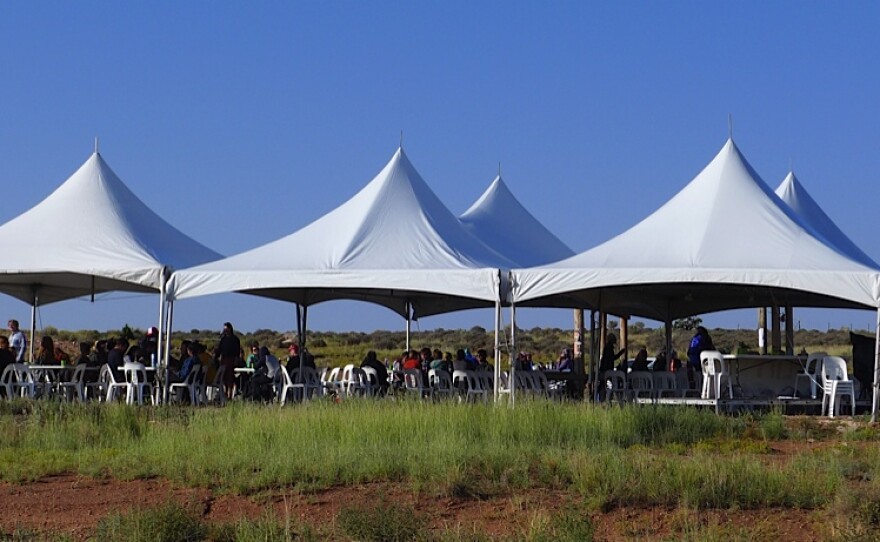At places like Bears Ears and Standing Rock, mainstream green groups have united with Native Americans to an unprecedented degree. Following that trend, the Grand Canyon Trust and Northern Arizona University invited a host of Four Corners tribal members to it’s third annual “Uplift” conference, which is designed to bring together a new generation of activists.
“I come from a community called Black Mesa. I am the community organizer. My name is Kendra Pinto and I’m from the Twin Pines area, so I’m on the Navajo Nation on the eastern side. Good greetings to everybody here, particularly our relations from Ute Mountain Ute, who are gracious to host us in your stomping ground.”
The Uplift gathering took place on a scenic mesa in Canyonlands that is threatened by oil and gas development, and it was periodically interrupted by the drone of scenic helicopter and airplane flights from the Moab airport. Among the Native American firebrands was Yolanda Badback, from the Ute village of White Mesa, who for years has worked to shut down the nearby White Mesa uranium mill.
“We have a lot of people in the community at this moment have been diagnosed with cancer, and when they go to the clinic in Blanding, the physicians there will not tell you how you are diagnosed, or what was the cause of the diagnosis. And I know that a lot of our young youth there have a lot of breathing problems to this day. So a lot of our youth don’t go out, hardly into the community to do their daily activities like play basketball, or play outside just to be kids. They’re mainly just inside the house because when it’s sunlight like this, you can smell the dust, when it starts to blow it blows down towards our area, and you can smell the chemicals. We have more lead in our well water as of today, then what it was before.”
Kendra Pinto is a veteran Navajo activist who lives near Chaco Canyon. She reinforced the theme of local native communities being decimated by extractive industries.
“Our issues are truck traffic, noise, light and dust pollution. Chaco is the third or fourth park around the world that receives the night sky program, or the night sky designation. And that’s my back yard, you know, and to see all these oil rigs going up, and producing this night pollution, and just cracking the earth to get these resources under our feet. It’s sad that they value whats under our feet more than who’s above it. And that’s who we need to speak for, the people who live in this extraction, the people who breathe it every single day. You know there are clouds of natural gas that we drive through, that we walk through out there all the time. We have an increase in cancer in our area. Asthma is going up, and COPD. Peoples health are changing, and not for the better. So we have to pay attention to that. I think people are aware of, well maybe the well site half a mile from you is what’s making you sick. You know, if you’re sick before you get out of bed, you should be alarmed, right?
"When you see oil activity pick up, crime picks up because the population increases. And our danger of accidents involving semi trucks that are carrying either oil or produced water have increased. Just these past two weeks there’s been two accidents involving the companies.”
Yolanda Badback, who recounted being harassed in the grocery store by Blanding residents, welcomes the new support from outside of San Juan County.
“You know, if we have all these different organizations calling us, and reporters calling me from right to left, and I can’t keep track of all of their names, and I’m like, okay, which reporter is this. It made a real big difference. When we did this before we didn’t have that much support.”
Also among the activists was Brooke Larsen, from Salt Lake City, who recently concluded a 1500-mile, solo bicycle ride through the Colorado Plateau, visiting with local green leaders.
“A lot of people think I’m kind of crazy since I did it in the hottest months. Some days I was biking in 106 degrees.”
Larsen said in the coming months we will see evidence of the new collaboration among local organizers.
“We’ve talked about coordinated actions across the Colorado Plateau. So maybe the same week we’ll have an action on the tar sands mine and the uranium mill and Black Mesa and then Chaco to show that we are united across this region, and it’s a shared struggle across the watershed.”
The Uplift program targets the under-30 crowd, but Kendra Pinto has begun imagining what her retirement will look like.
“As a little old lady I’m going to live in a hogan in the middle of nowhere, you know, with no running water and no electricity, because that’s the way our people have been living.”













